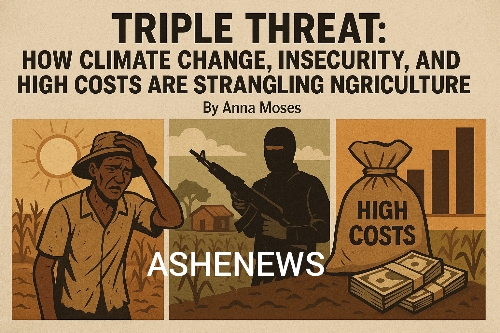Nigeria’s agricultural sector—long the backbone of the economy and a lifeline for millions—is being battered by a triple threat: climate change, insecurity, and soaring input costs. Together, these crises are endangering national food security and economic stability.
By Anna Moses
Farmers across the country are struggling with erratic weather patterns, skyrocketing prices of inputs, and a surge in rural insecurity that has rendered many farmlands inaccessible.
Recent data from the Nigerian Meteorological Agency (NiMet) show that the 2024/2025 farming season recorded below-average rainfall in many parts of the country, especially in the North and Middle Belt. Several states faced delayed or failed planting, while others were hit by floods that wiped out crops.
“We planted maize in May, hoping the rains would support growth,” said Fatima Musa, a smallholder farmer in Niger State. “The rain came, but so did the flood. It destroyed everything. Many of us lost all we had.”
The situation is worsened by growing insecurity, particularly in the North-East and North-Central regions. Armed bandits, kidnappers, and persistent herder-farmer clashes have forced many to flee their farms.
“We can’t go to the farm without fear. Our lives are at risk here in Benue State,” said Mwuese Kajo, a displaced farmer. “Farmers are being killed, and those of us left have run away to save our lives.”
At the same time, rising costs have added yet another burden. Prices of fertilizers, improved seeds, pesticides, and machinery have more than doubled due to inflation and the naira’s depreciation. According to the National Bureau of Statistics, food inflation surged by 40 percent this year, making staples like rice, maize, and tomatoes unaffordable for many households.
Without urgent intervention, the sector could spiral further into crisis. Stakeholders are urging the government to prioritize investment in climate-smart agriculture, irrigation, mechanization, and agricultural extension services.
They are also calling for coordinated efforts between security agencies and the agricultural sector to protect farmers and safeguard food production.
As these challenges deepen, the future of Nigerian agriculture—and the nation’s food security—hangs in the balance.


